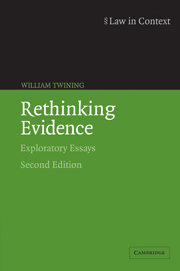Book contents
- Frontmatter
- Contents
- Preface
- Acknowledgements
- List of abbreviations
- Table of cases
- 1 Introduction: the story of a project
- 2 Taking facts seriously
- 3 The Rationalist Tradition of evidence scholarship
- 4 Some scepticism about some scepticisms
- 5 Identification and misidentification in legal processes: redefining the problem
- 6 What is the law of evidence?
- 7 Rethinking Evidence
- 8 Legal reasoning and argumentation
- 9 Stories and argument
- 10 Lawyers' stories
- 11 Narrative and generalizations in argumentation about questions of fact
- 12 Reconstructing the truth about Edith Thompson the Shakespearean and the jurist
- 13 The Ratio Decidendi of the Parable of the Prodigal Son
- 14 Taking facts seriously – again
- 15 Evidence as a multi-disciplinary subject
- Bibliography
- Index
6 - What is the law of evidence?
Published online by Cambridge University Press: 15 December 2009
- Frontmatter
- Contents
- Preface
- Acknowledgements
- List of abbreviations
- Table of cases
- 1 Introduction: the story of a project
- 2 Taking facts seriously
- 3 The Rationalist Tradition of evidence scholarship
- 4 Some scepticism about some scepticisms
- 5 Identification and misidentification in legal processes: redefining the problem
- 6 What is the law of evidence?
- 7 Rethinking Evidence
- 8 Legal reasoning and argumentation
- 9 Stories and argument
- 10 Lawyers' stories
- 11 Narrative and generalizations in argumentation about questions of fact
- 12 Reconstructing the truth about Edith Thompson the Shakespearean and the jurist
- 13 The Ratio Decidendi of the Parable of the Prodigal Son
- 14 Taking facts seriously – again
- 15 Evidence as a multi-disciplinary subject
- Bibliography
- Index
Summary
Introduction
Cross-cultural communication invites exchanges of stereotypes. A common kind of English joke involves trying to explain the mysteries of the game of cricket to foreigners. Conversely many foreign commentators treat cricket as a symbol of the English character. The English Law of Evidence is often presented as being even more bizarre and complex than the game of cricket. Anglo–American legal proceedings are often perceived as a kind of game, in which fair play and American conceptions of due process have indeed played an important role in the development and survival of some of our technical rules of evidence. But like all analogies it can be pressed too far. Here, two important differences reflect central themes in this essay. On the one hand, I shall argue that our law of evidence is, in its fundamentals, much simpler than is commonly supposed. On the other hand, while I am prepared to give unqualified loyalty to the game of cricket, I share with most common lawyers a deep ambivalence about some important aspects of our law of evidence.
The purpose of this chapter is to try to demystify the modern English Law of Evidence by presenting a broad overview, shorn of the complexities and details that are the reason for its reputation. The standpoint is that of an expositor trying to give a clear and realistic overview of this branch of English law to newcomers to the subject, whether they be law students or lawyers trained in a different system.
- Type
- Chapter
- Information
- Rethinking EvidenceExploratory Essays, pp. 192 - 236Publisher: Cambridge University PressPrint publication year: 2006



